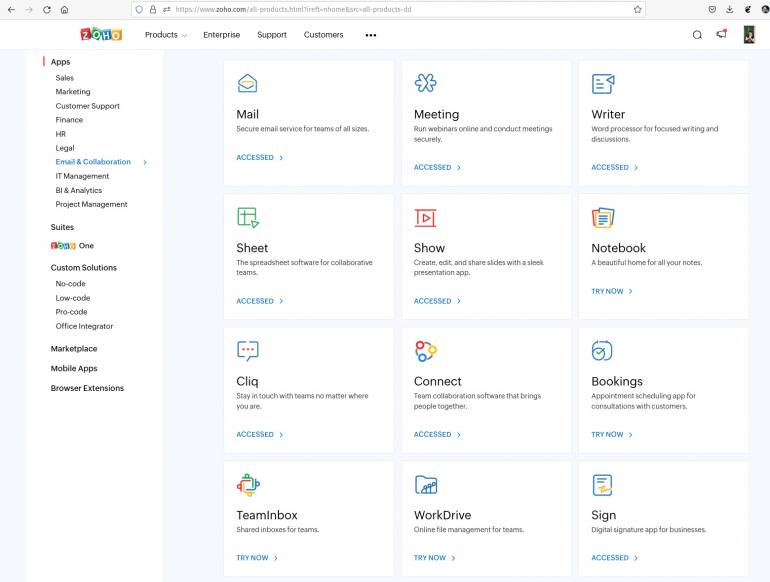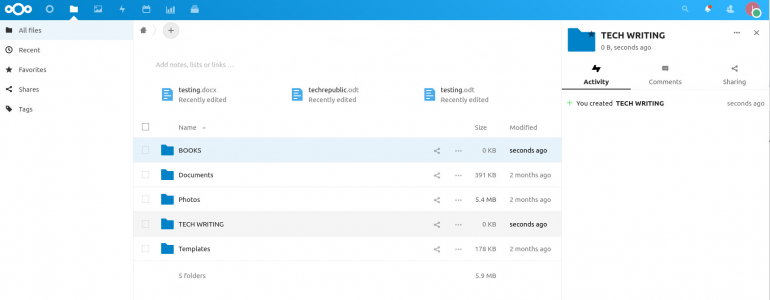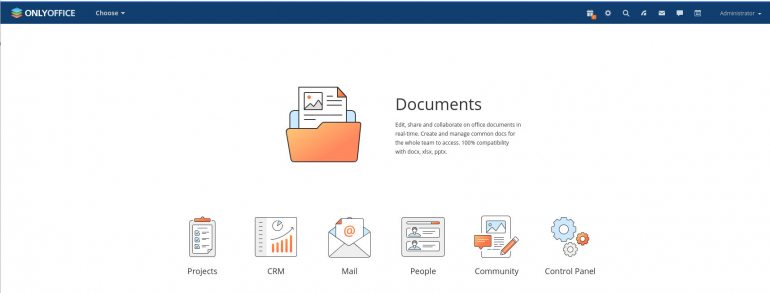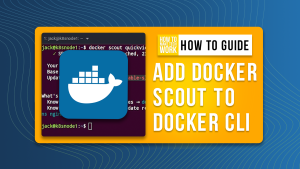
When you think of office suites, most likely two platforms come to mind: Office 365 and Google Workspaces. Both of those offerings offer outstanding features, stability, a user-friendly interface, and (at least with Google) free tools for users.
SEE: Feature comparison: Time tracking software and systems (TechRepublic Premium)
But those aren’t the only options; in fact, there are a number of office suites that are ready to serve you well. Some of those tools are cloud-based and some are installed locally, but all of them can get the job done. And you might be surprised to find out that most of them can stand toe-to-toe with the de facto standards.
Let’s take a look at five alternative office suites that aren’t built by either Microsoft or Google.
Zoho Office

Zoho has been around for quite some time, slowly building a vast repository of tools to offer business users and individuals alike. The number of tools offered by Zoho is staggering, which might be a bit overwhelming to some. Just navigating around the Zoho ecosystem can get a bit confusing.
If you’ve used either Google Workspace or Office 365, Zoho Workplace will be surprisingly familiar. The default app displayed on the workplace.zoho.com URL is mail, but from the menu button (upper right corner) you can access links for Meeting, Writer, Sheet, Show, Notebook, Cliq, Connect, Bookings and more. In fact, a bit of exploration will reveal Zoho has an app for just about everything. Pricing for Zoho Workplace includes the Standard account at $3/month/user for 30GB mail storage (per user) and 10GB WorkDrive storage (per user) and the Profesional account at $6/month/user for 100GB mail and 100GB WorkDrive storage.
NextCloud

Nextcloud is my on-premise cloud platform of choice. Not only is it open source, but it’s also incredibly flexible, reliable and secure. Nextcloud also includes integration with a full-blown office suite that can easily serve your needs. You’ll find tools for documents, spreadsheets, presentations, file management and sharing, video and audio chat, and more. Even better, if there’s not a tool installed by default, you can head over to the Nextcloud App Store and install even more tools to help you get your jobs done.
What I like most about Nextcloud (besides everything already mentioned here), is that I can install it locally on my own server so data is never shared outside my LAN. So, if the idea of storing your important documents on a third-party server rubs you the wrong way, Nextcloud is a fantastic option. Nextcloud is free to download and use.
ONLYOFFICE

The ONLYOFFICE Document Server can be a bit tricky to get up and running (thanks to Docker, that’s considerably easier), but the effort is worth it. Once up and running, you’ll find a well-designed user-interface that gives you access to tools for documents, spreadsheets, project management, CRM, mail, contacts and more. ONLYOFFICE also allows you to share and collaborate with your documents and offers 100% compatibility with docx, xlsx and pptx. And, like Nextcloud, you’ll be storing all of your documents on your own server, so you can retain control over who sees what.
One thing to keep in mind, however, the best route to deploying the ONLYOFFICE Document Server is via Docker, so you’ll need to have a bit of knowledge with that container runtime engine to get this platform up and running. The learning curve might well be worth it. Deploying ONLYOFFICE via Docker is free.
iCloud
![]()
Apple’s iCloud allows users to access the iWork suite of tools, which includes Mail, Contacts, Calendar, Photos, iCloud Drive, Pages, Numbers, Keynote, Reminders and more. If you’ve never experienced the power of Pages, you’re missing out. This outstanding word processor bests a lot of the competition in features and UI, even though it does have a slightly higher learning curve. But once you get beyond that curve, you’ll find Pages to be an absolutely rock-solid tool for documents.
Even better, Pages offers the ability to import/export to the docx format, so you won’t miss out on collaborating with your colleagues who use Office 365. Each of the other tools found on iCloud also stands up to the competition. The only caveat is that the iCloud layout could use a bit of work. Instead of having one interface that integrates all of the tools, you have to open each tool individually from the icloud.com site (as though you were working on a mobile device). Despite that one downfall, iCloud is very much a viable option and is free to use for anyone who’s purchased an Apple laptop or desktop.
Softmaker Office
![]()
This is the only option on the list that isn’t based in the cloud. Softmaker Office is a traditional office suite that offers some of the best MS document format compatibility. Available for Linux, macOS and Windows, Softmaker Office includes documents, spreadsheets, presentations and offers PDF creation (including archival PDFs), version management, research tools, customizable UI, quick access toolbar, dark mode, touchscreen mode, tabbed windows, templates, and much more.
Softmaker Office is not open-source and does have an associated price. You can either subscribe to SoftMaker Office NX Universal for $4.99/month or NX Home for $29.99/month or purchase SoftMaker Office 2021 for $79.95.
Subscribe to TechRepublic’s How To Make Tech Work on YouTube for all the latest tech advice for business pros from Jack Wallen.
Source of Article



